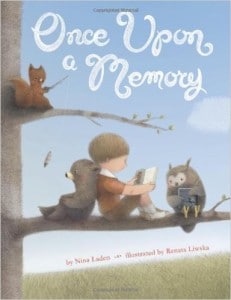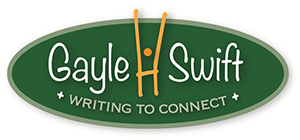 Even very young children recognize the signal phrase, Once upon a time so when they read Nina Laden’s evocative picture book Once upon a Memory, they will intuitively prepare for a magical story. The gorgeous illustrations by Renata Liwska have a soft-focus, watercolor-type glow that perfectly serve the story and capture a dreamy, time-traveling mood. Detailed drawings expand the spare text and invite further exploration of the thematic ideas.
Even very young children recognize the signal phrase, Once upon a time so when they read Nina Laden’s evocative picture book Once upon a Memory, they will intuitively prepare for a magical story. The gorgeous illustrations by Renata Liwska have a soft-focus, watercolor-type glow that perfectly serve the story and capture a dreamy, time-traveling mood. Detailed drawings expand the spare text and invite further exploration of the thematic ideas.
Simple rhymes lilt softly on the ear, enhance the dreamy mood and encourage young readers to explore beyond the obvious into their own personal experiences. Colored font highlights key words and further spotlights the connection between the item in its current state back through time to a former state. For example,
“Does a feather remember it once was … a bird?”
Each page offers a chance to delve deeper into the questions and discuss how change occurs in people, places and things. One could simply enjoy this wonderful chance to ride the magic carpet of imagination and fantasy. Or one could use it as a path to some simple STEM activities—science, technology, engineering and mathematics.
 AQ Lens: For adopted children this book can offer a path to conversations about their past. For example, the final pairing, “Will you remember you once were … a child?” could naturally evolve into discussing their thoughts about their life story before they were adopted. Older children might wish to express any what-if thoughts about how their lives might have been different had they never been adopted, or if they’d been adopted by other parents.
AQ Lens: For adopted children this book can offer a path to conversations about their past. For example, the final pairing, “Will you remember you once were … a child?” could naturally evolve into discussing their thoughts about their life story before they were adopted. Older children might wish to express any what-if thoughts about how their lives might have been different had they never been adopted, or if they’d been adopted by other parents.
(Many adult adoptees say they had these thoughts but felt afraid or unwelcome to share these somewhat scary and unsettling thoughts with their adoptive families because they did not want to hurt their adoptive parents and/or seem disloyal.}
Parents can nudge children towards a conversation like this through indirect questions like, “Some kids (note the absence of reference to adoption,) wonder how events in their lives might be different, for example, if they didn’t have their family pet…” Kids can then decide if they want to make the conversation real personal or keep it general.
Sharing a book like Once upon a Memory, reassures a child that his thoughts are safe to share and allows parents to comfort and reassure their child with unconditional love and acceptance. While it can be awkward to have such Difficult Conversations, it is important to do so. And to offer the possibility on a regular basis.
We never want to force a child to talk but it is essential that we sincerely convey are willingness to do so as well as our ability to be strong enough to hear our children’s thoughts. Don’t mistake a child’s resistance as disinterest. (And please do not breathe an audible sigh of relief when they decline to talk about adoption “stuff”. Parent and child both need courage, empathy, and compassion.) Use your best adoption-attuned intuition to identify what is behind their reluctance. They may simply need more convincing that our invitation is genuine or may not be ready at that moment. Children are interested–and probably a bit wary and uncomfortable–but they still benefit from such conversations.

